The local Ukrainian press, which barely survived in competition with online media and social networks even before the war today, found itself on the verge of extinction.
Ways to survive and reach a new level by mastering modern technological, journalistic, and marketing approaches were discussed during a two-day offline training session within the educational project titled Steps To Sustainable Development conducted by the National Union of Journalists of Ukraine (NUJU) for local media from the front-line and de-occupied territories.
“As editors of front-line newspapers, you are irreplaceable in your role, and your role is crucial,” Guilherme Canela, the chief of the section of Freedom of Expression and Safety of Journalists at UNESCO headquarters in Paris, emphasized to the participants of the training. “Especially in times of war, local and regional media can provide life-saving access to reliable and accurate information. This plays a crucial role in ensuring that the people of Ukraine can receive humanitarian, conflict-sensitive, and verified information.“
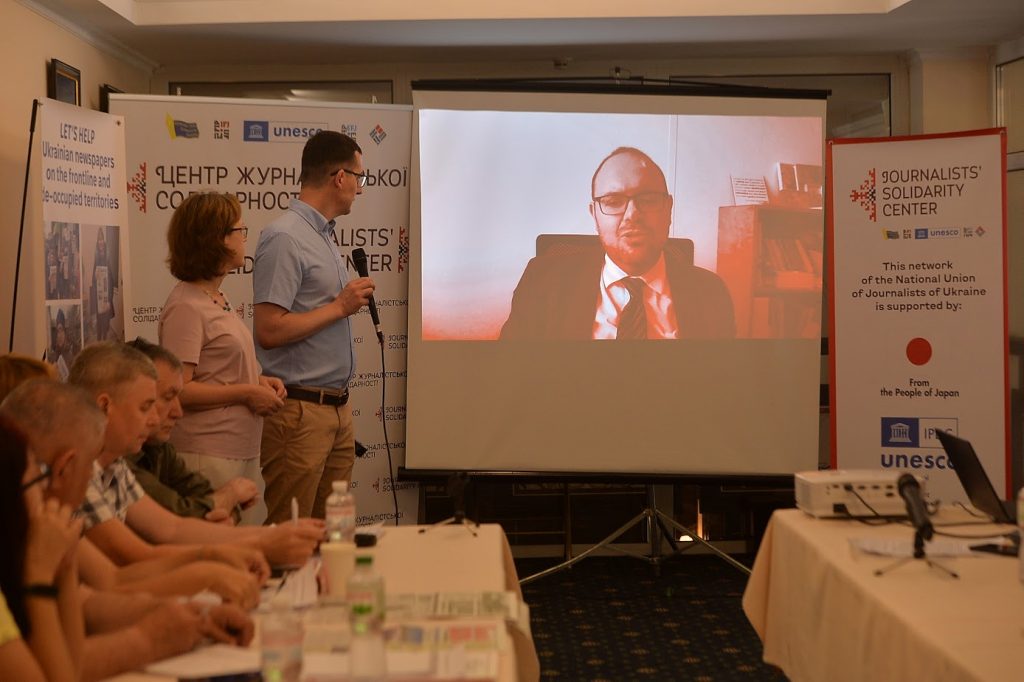
Sergiy Tomilenko, the President of the NUJU, emphasized that the Ukrainian press in the front-line and de-occupied territories is a symbol of unity, faith, and inspiration for Ukrainians to fight and win.
“Currently, in the front-line territories, where there are problems with communications, the traditional print media, which are trusted by local residents, are getting a second wind,” said Sergiy Tomilenko. “The infrastructure in the de-occupied and front-line territories suffers significantly due to shelling and recovers very slowly, so electronic media are often inaccessible to the audience. In contrast, print media not only do not depend on the availability of the Internet or electricity but also traditionally have a lot of trust from local residents.
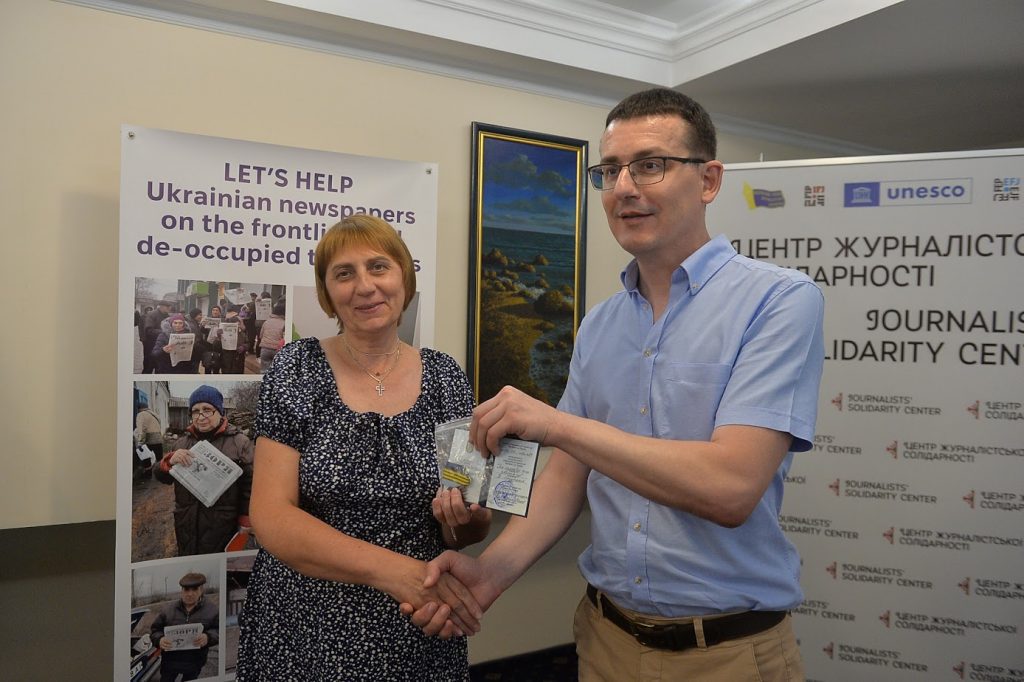
According to Lina Kushch, the First Secretary of the NUJU, the Union‘s task is not just to restore newspapers published before the war but to revive them as modern media with the involvement of digital platforms.
“It is especially important to invest in human capital,” Lina Kushch emphasized. “Journalists suffer a lot from the consequences of the war. The issue of journalist personnel, who will work in the restored media and talk about the restoration of Ukraine, is in the field of attention of the NUJU, and we will talk about it on all platforms.“
Secretary of the NUJU Vitalii Holubev familiarized the training participants with the results of his study of the needs of local newspapers from the front-line and de-occupied territories. As it turned out, after a forced multi-month break, on average six months, 90% of the newspapers participating in the study resumed publication, but three newspapers published only 1-2 issues. All newspapers, except one, reduced the number of pages on average by half; every second printed publication reduced the frequency of publishing by 2-4 times. Therefore, the resumption of newspaper production generally took place, but in an economic mode.
Bohdan Chervak, the first deputy chairman of the State for Television and Radio Broadcasting Committee of Ukraine, who took part in the discussion of the study, noted that the restoration of the media is, in fact, the first step in the post-war reconstruction of Ukraine.
“In the de-occupied territories, print media have become a kind of marker of Ukrainian statehood: people everywhere rejoice at familiar newspapers with familiar logos, familiar surnames of journalists,” said Chervak.
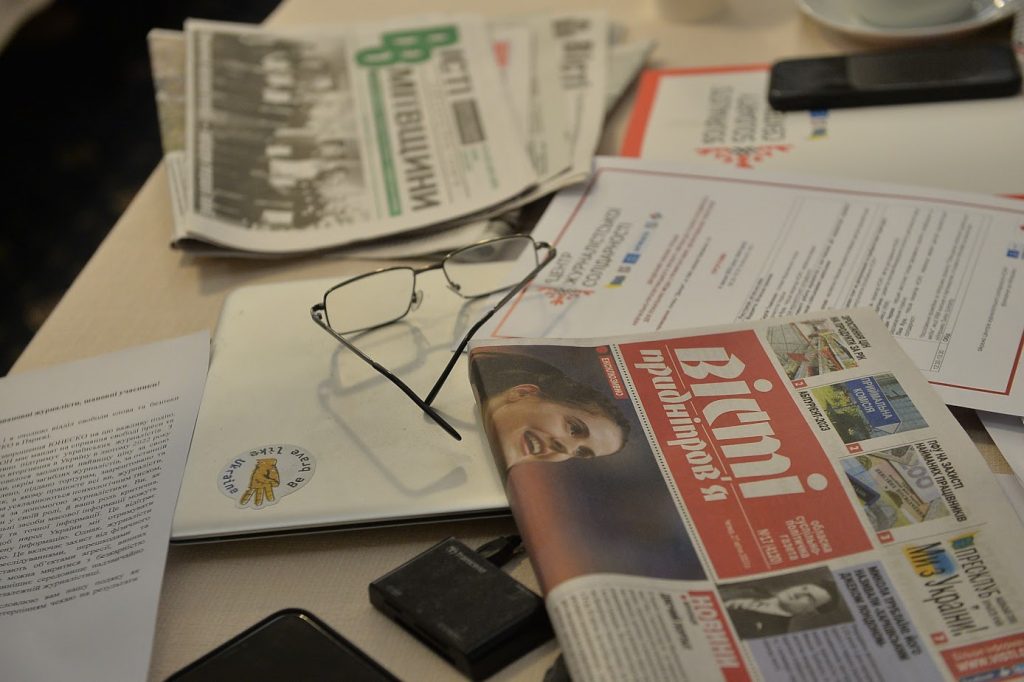
Journalists participating in the discussion emphasized that authorities – both state and local self-government should implement a well-thought-out information policy aimed at the survival of local media. There are many comments in the media about the activities of the Ukrposhta state postal service, which they consider unconstructive in relation to the press because, with the increase in prices for postal services, the quality of these services is consistently low.
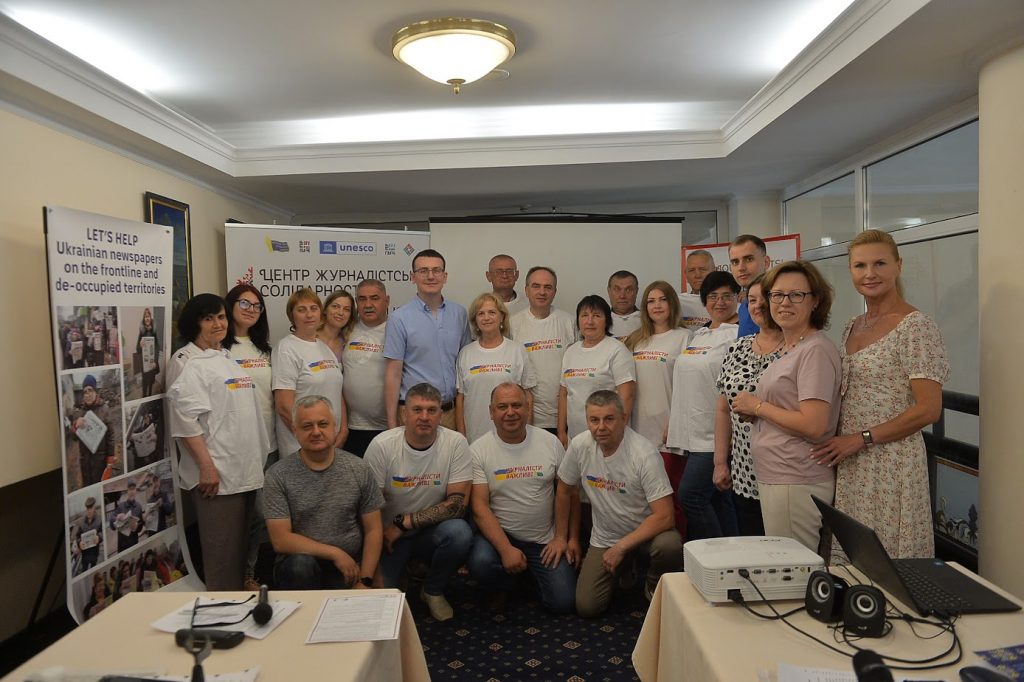
Yuliya Surkova, a journalist from the France Press news agency, talked about new safety challenges and ethical issues that arise for journalists during man-made disasters and extreme events. In particular, she emphasized that when covering the flooding of southern Ukraine as a result of the explosion at the Kakhovka hydroelectric power plant, journalists faced a new safety issue: whether to wear a bulletproof vest, risking drowning under its weight, or remove it and increase the risk of being killed as a result of shelling. New ethical issues have also arisen: in particular, whether one should sacrifice one’s professional duties in covering the evacuation of victims in order to leave more seats in the boat or car for the evacuees.
 Kostiantyn Hryhorenko, a secretary of the NUJU/editor of the Obrii Iziumshchyny newspaper (Kharkiv Region), shared the experience of restoring the work of local media in the de-occupied and near-front territories. He talked about the mechanisms of financing publications with the involvement of donor funds, advertising companies, the involvement of new technologies, in particular QR codes, the production of printing products, etc.
Kostiantyn Hryhorenko, a secretary of the NUJU/editor of the Obrii Iziumshchyny newspaper (Kharkiv Region), shared the experience of restoring the work of local media in the de-occupied and near-front territories. He talked about the mechanisms of financing publications with the involvement of donor funds, advertising companies, the involvement of new technologies, in particular QR codes, the production of printing products, etc.
“Before the war, we were a self-sufficient newsroom that had a stable income and without any subsidies or grants provided the weekly issue of two printed editions with a total volume of 40 pages,” says Svitlana Ovcharenko, the editor-in-chief of the Vpered newspaper from the city of Bakhmut, Donetsk Region. “When the war started, we got rid of everything we had. I applied for grants but was denied, and I did not even hope to restore the Vpered newspaper. But with the support of the NUJU, we have resumed printing our publication. It was a real miracle. Thanks to the information from the Forward newspaper, many Bakhmut residents got to know how to evacuate from the city, where to get stoves and humanitarian aid, and where to apply for government services. This information saved many lives.”
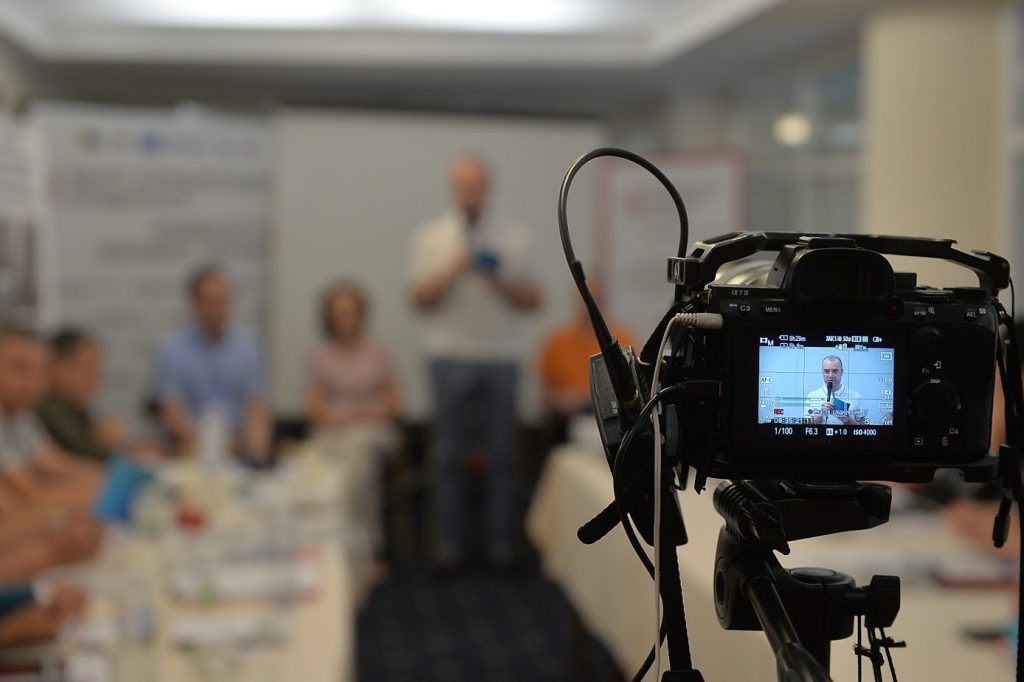
The training for front-line media was conducted by the NUJU’s network of Journalists’ Solidarity Centers with the support of UNESCO and the People of Japan as part of the project titled Supporting Safety And Professional Rights Of Journalists In Ukraine.
ABOUT UNESCO
UNESCO is the United Nations Educational, Scientific, and Cultural Organization. It contributes to peace and security by promoting international cooperation in education, sciences, culture, communication, and information. UNESCO promotes knowledge sharing and the free flow of ideas to accelerate mutual understanding. It is the coordinator of the UN Action Plan on the Safety of Journalists and the Issue of Impunity, which aims to create a free and safe environment for journalists and media workers, thus strengthening peace, democracy, and sustainable development worldwide. UNESCO is working closely with its partner organizations in Ukraine to provide support to journalists on the ground.
The designations employed and the presentation of material throughout this digest do not imply the expression of any opinion whatsoever on the part of UNESCO concerning the legal status of any country, territory, city, or area or its authorities or concerning the delimitation of its frontiers or boundaries.
The authors are responsible for the choice and the presentation of the facts contained in this digest and for the opinions expressed therein, which are not necessarily those of UNESCO and do not commit to the organization.

 THE NATIONAL UNION OF
JOURNALISTS OF UKRAINE
THE NATIONAL UNION OF
JOURNALISTS OF UKRAINE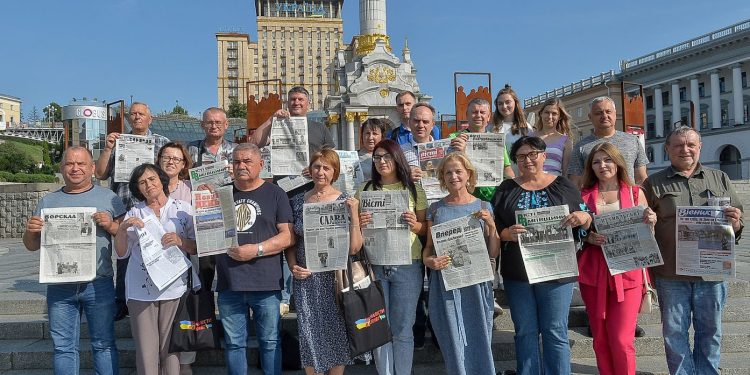
















Discussion about this post